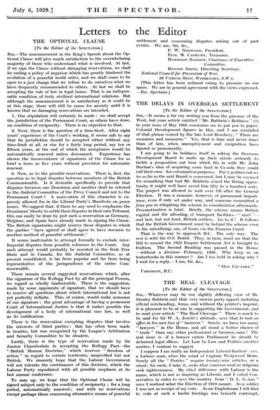Letters to the Editor
THE OPTIONAL CLAUSE
[To the Editor of the SPECTATOR.]
SIR,—The announcement in the King's Speech about the Op- tional Clause will give much satisfaction to the overwhelming majority of those who understand what is involved. At last, if we sign the Clause without damaging reservations, we shall be ending a policy of negation which has greatly hindered the evolution of a peaceful world order, and we shall cease to be open to a just charge that we refuse to do ourselves what we have frequently recommended to others. At last we shall be accepting the rule of law in legal issues. That is an indispen- sable condition of truly civilized international relations. But although the announcement is as satisfactory as it could be at this stage, there will still be cause for anxiety until it is known that no damaging reservations are intended.
1. One stipulation will certainly be made : we shall accept the jurisdiction of the Permanent Court, as others have done, on condition of reciprocity. There is no objection to that.
2. Next, there is the question of a time-limit. After eight years' experience of the Court's working, it seems safe to say that its jurisdiction should be accepted either without any time-limit at all, or else for a fairly long period, say ten or fifteen years, at the end of which the acceptance would be automatically renewed unless denounced. Experience has shown the inconvenience of signatures of the Clause for so brief a term as five years without -provision for automatic renewal.
3. Now, as to the possible reservations. There is, first, the question as to legal disputes between members of the British Commonwealth. Is it desirable specifically to provide that disputes between one Dominion and another shall be referred to the Judicial Committee of the Privy Council and not to the Permanent Court ? A reservation of this character is ex- pressly allowed for in the Liberal Party's Manifesto on peace issues. We suggest that, if there be any need to emphasize the Dominions' liberty to settle their disputes in their own Tribunal, this can easily be done by just such a reservation as Germany, Belgium, and Spain have already made in signing the Clause. The British signatories might reserve those disputes in which the parties "have agreed or shall agree to have recourse to another method of peaceful settlement."
It seems inadvisable to attempt formally to exclude inter Imperial disputes from possible reference to the Court. Any such attempt would probably be resented in the Irish Free State and in Canada, for the Judicial Committee, as at present constituted, is far from popular and far from being representative of the jurisprudence of the entire Com- monwealth.
There remain several suggested reservations which, after the signature of the Kellogg Pact by all the principal Powers, we regard as wholly inadmissible. There is the suggestion, made by some opponents of signature, that we should have to reserve all questions about which international law is not yet perfectly definite. This, of course, would make nonsense of our signature : the great advantage of having a permanent Court of International Justice is that it makes possible the development of a body of international case law, as well as its codification.
There is the reservation excepting disputes that involve the interests of third parties : this has often been made in treaties, but was recognized by the League's Arbitration and Security Committee to be obsolete.
Lastly, there is the type of reservation made by Sir Austen Chamberlain in accepting the Kellogg Pact—the "British Monroe Doctrine," which reserves "freedom of action" in regard to certain territories, unspecified but not British. We sincerely hope that the Labour Government will not tolerate the continuance of this doctrine, which the Labour Party repudiated with all possible emphasis at its last annual conference.
To sum up, we hope that the Optional Clause will be signed subject only to the condition of reciprocity ; for a long period, automatically renewed ; and with no reservations except perhaps those concerning alternative means of peaceful settlement and concerning disputes arising out of past events.—We are, Sir, &c.,
F. W. NORWOOD, President.
Eraz. M. CADBURY, Treasurer.
HARRISON BARROW, Chairman of Executive
Committee.
RENNIE SMITH, Directing Secretary. National Council for Prevention of War,
39 Victoria Street, Westminster, S.W.1.
[This letter has been reduced owing to pressure on our space. We are in general agreement with the views expressed. —En. Spectator.]










































 Previous page
Previous page